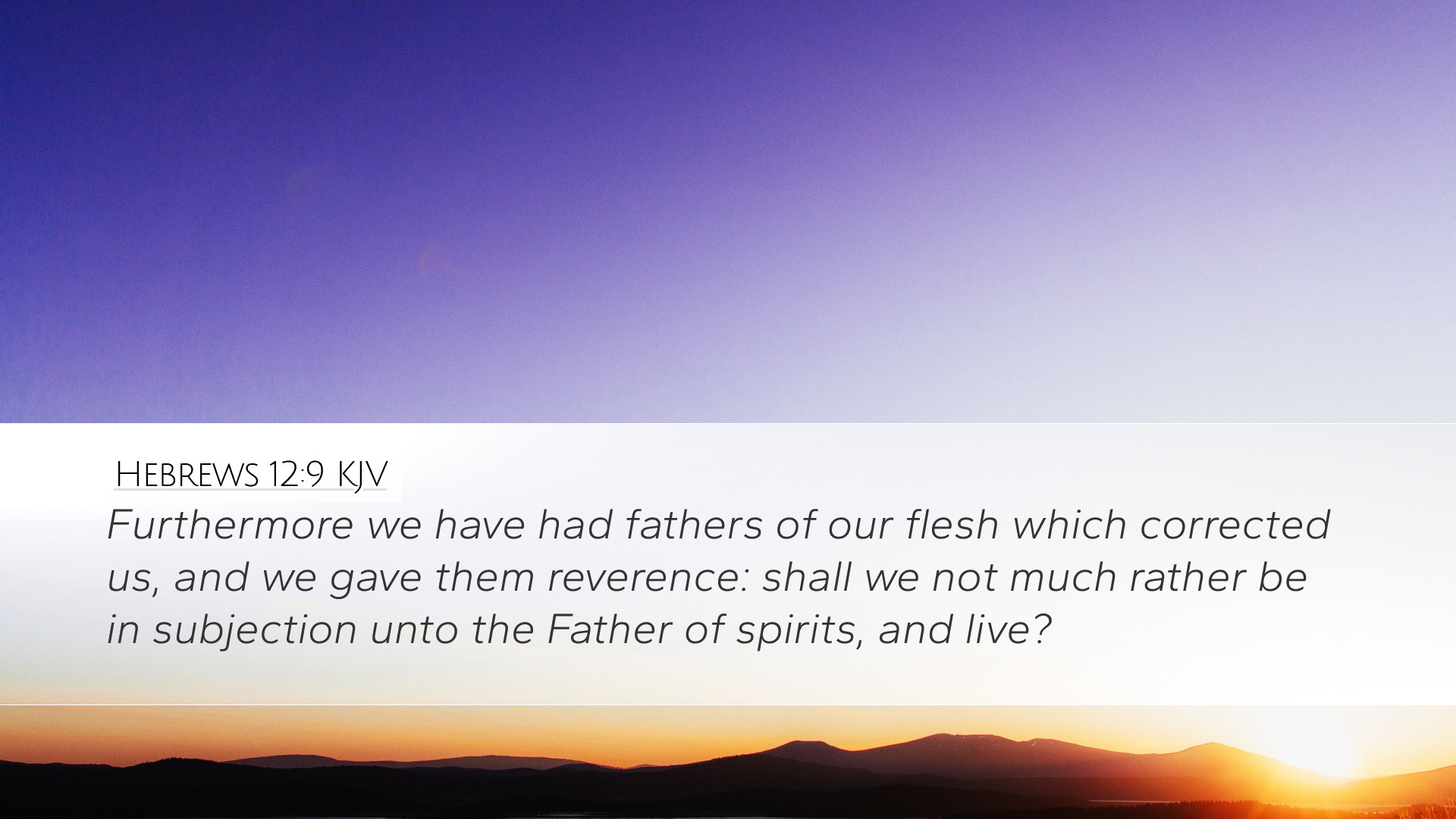Commentary on Hebrews 12:9
Verse: "Furthermore, we have had fathers of our flesh which corrected us, and we gave them reverence: shall we not much rather be in subjection unto the Father of spirits, and live?" (Hebrews 12:9)
Contextual Overview
This verse is set within the broader context of Hebrews 12, wherein the author exhorts believers to endure discipline as a means of spiritual growth. The comparison of God's discipline to that of earthly fathers highlights the nature of divine correction and its ultimate purpose in fostering holiness among believers.
Insights from Matthew Henry
Matthew Henry emphasizes the natural expectation of reverence towards earthly fathers who correct their children. He posits that this reverence is aligned with the expectation of submission to God, the ‘Father of spirits’. Henry outlines several themes:
- Parental Authority: Earthly fathers possess authority to correct and guide their children, which inherently brings a level of respect and awe from their offspring.
- Discipline as a Necessity: Just as children require correction for their upbringing, so do the faithful require God's discipline for their spiritual development.
- Divine Relationship: The author mentions God as the "Father of spirits," indicating a spiritual kinship that exceeds earthly relationships. This relationship necessitates a greater submission.
Henry concludes that acknowledging God’s authority as the source of spiritual life and discipline is vital for living a fulfilling and holy life.
Insights from Albert Barnes
Albert Barnes adds depth by analyzing the metaphoric implications of "Father of spirits." He interprets this title as a reference not only to God's role in creation but also to His sustaining power over both physical and spiritual life. Key points include:
- Contrast of Authority: Barnes contrasts the authority of earthly fathers with that of God, noting that while human authority is flawed, divine authority is absolute and perfect.
- Purpose of Discipline: Barnes frequently emphasizes that God’s corrections are rooted in love and aimed at the spiritual well-being of believers, leading them toward eternal life.
- Living in Subjection: He argues that to be in subjection is not merely a matter of obedience but an acknowledgment of God's rightful place in the life of believers.
He encourages readers to view God's discipline as a sign of His love, akin to how a father loves his children, pushing them toward maturity.
Insights from Adam Clarke
Adam Clarke provides a detailed exploration of the term "discipline," dissecting its implications in both ancient and contemporary contexts. He observes the following:
- Discipline and Life: Clarke connects the act of discipline with the gift of life, arguing that resisting correction ultimately leads to spiritual death, while submissive acceptance fosters true living.
- Historical Perspective: He reflects on the practices of ancient cultures regarding parental discipline, highlighting the universality of correction across societies as a means of fostering virtue and moral character.
- God’s Sovereignty: Clarke notes that the concept of God as the ultimate authority transcends time and culture, emphasizing His role as not only a disciplinarian but also the giver of life and spirit.
Clarke encourages believers to embrace discipline not as a form of punishment but as an essential part of spiritual growth and connection with the divine.
Theological Implications
The verse invites theological reflection on the nature of divine authority and parental relationships. It highlights several crucial themes:
- Authority and Reverence: The relationship between earthly fathers and their children serves as an allegory for our relationship with God, emphasizing the importance of reverence and submission.
- The Role of Discipline: Embracing discipline as indicative of God’s love shifts the perception of suffering and hardship in the believer's life into an understanding of divine refining.
- Spiritual Vitality: Submission to God's discipline is tied directly to the promise of spiritual vitality, suggesting that true life is found in alignment with God's will.
Conclusion
The exhortation found in Hebrews 12:9 serves as a profound reminder for believers regarding the essence of divine correction. It is not merely a call to obey but an invitation to recognize the depth of God's commitment to our growth. The insights from the commentaries of Henry, Barnes, and Clarke collectively affirm that understanding God's discipline allows Christians to embrace their spiritual journey with reverence and trust in His sovereignty.


